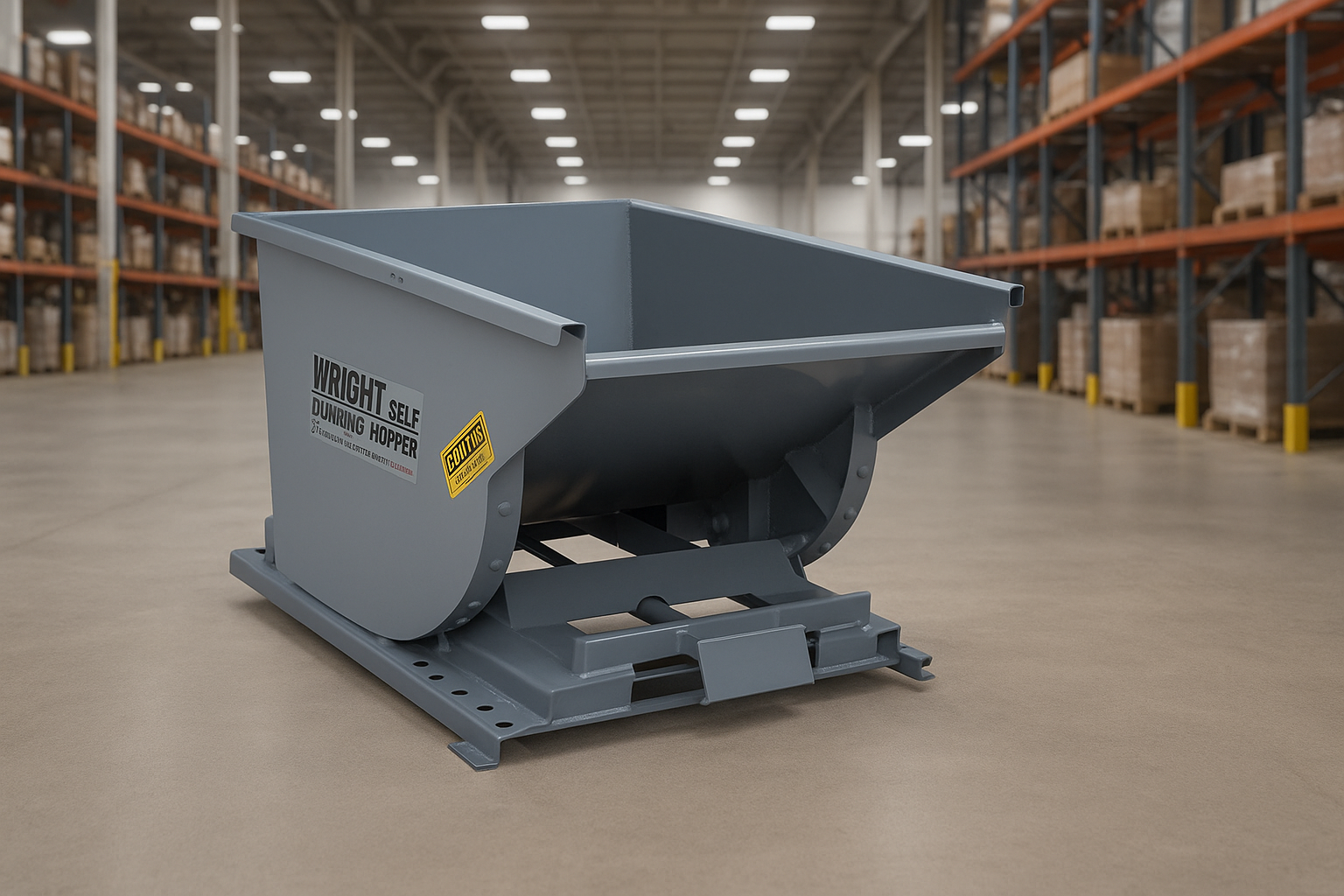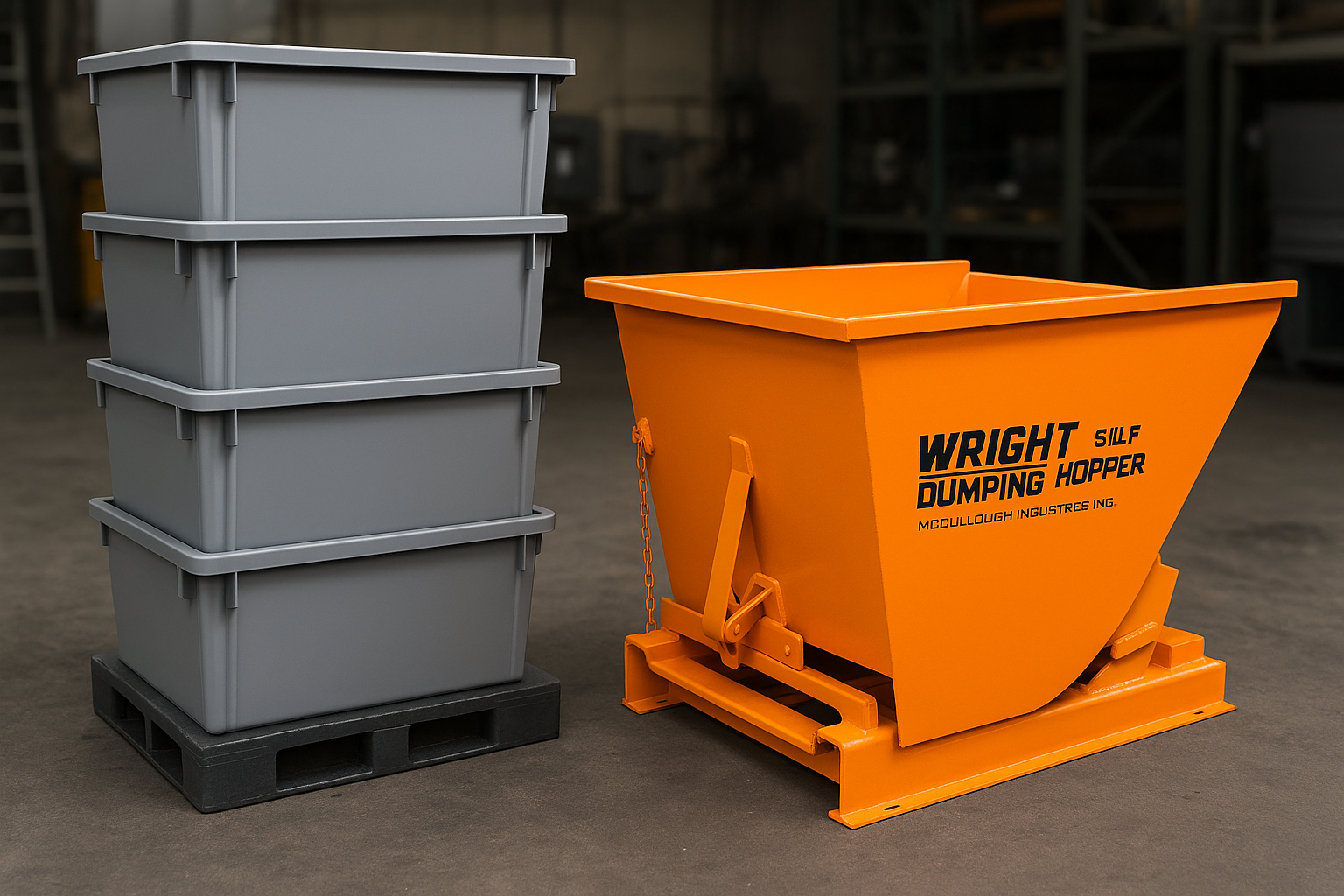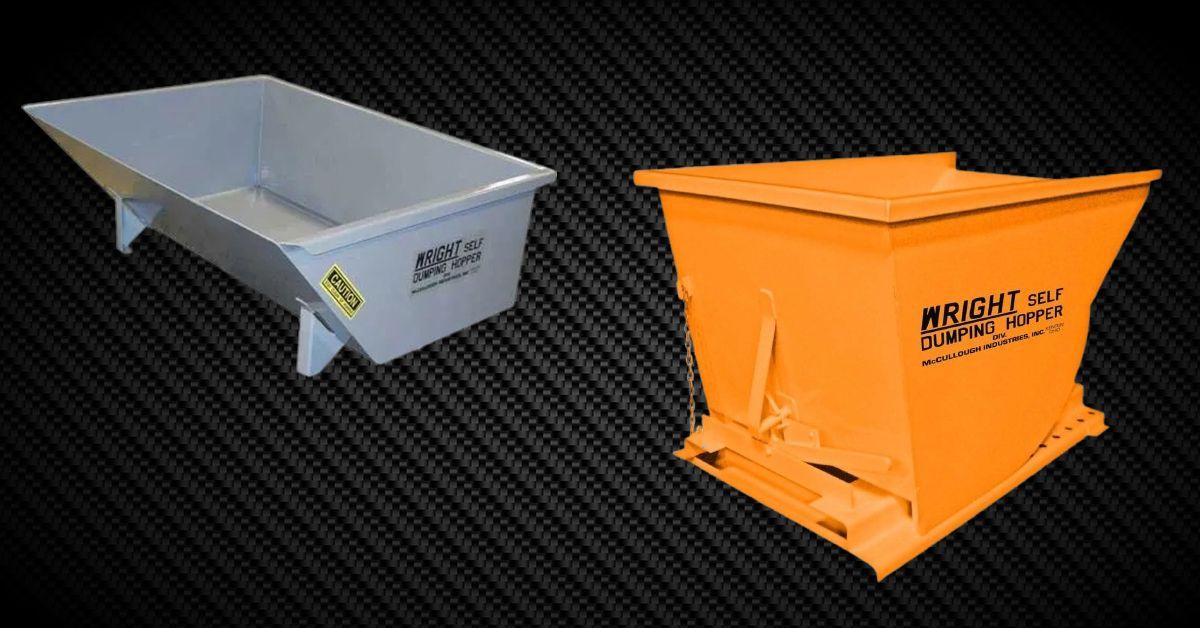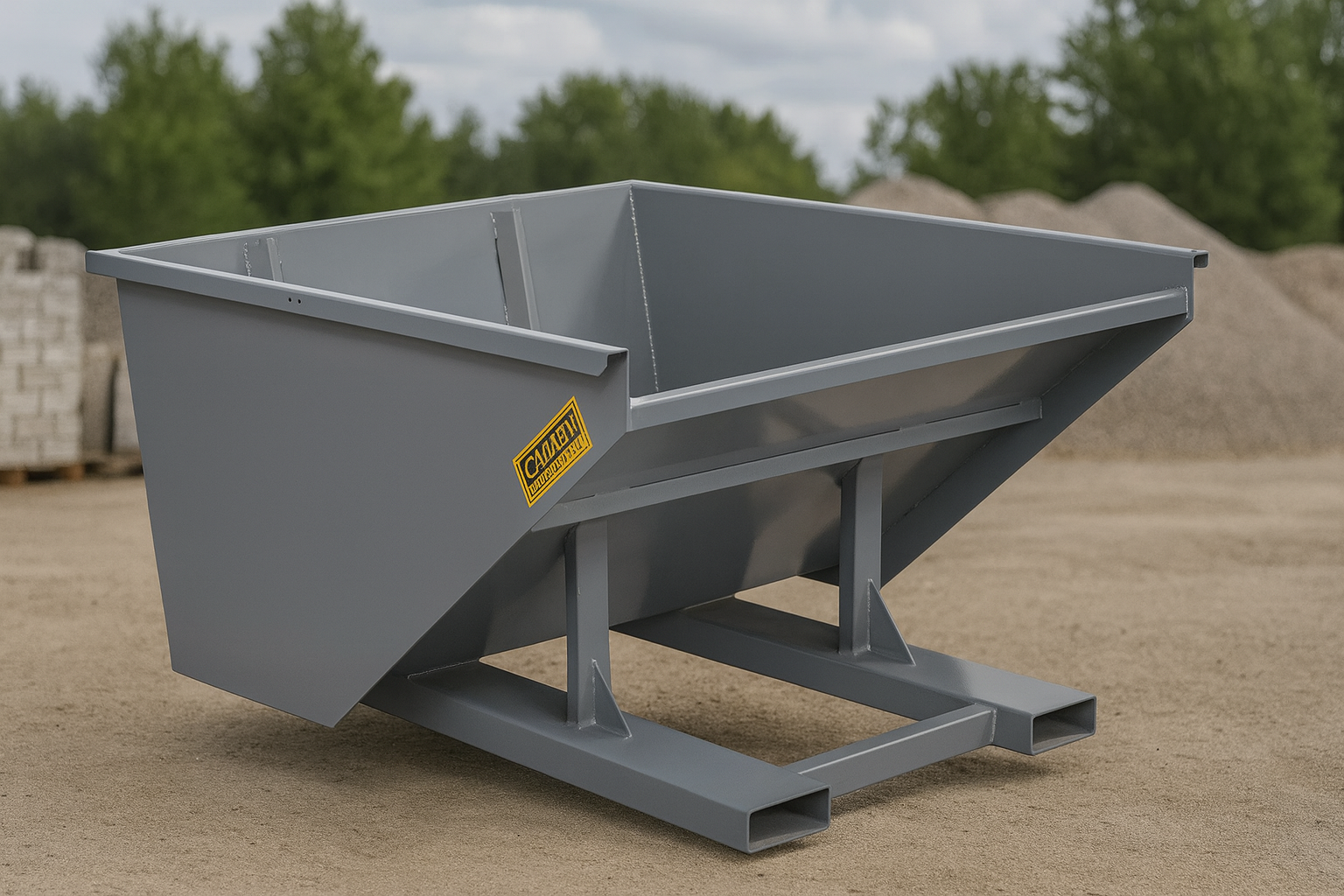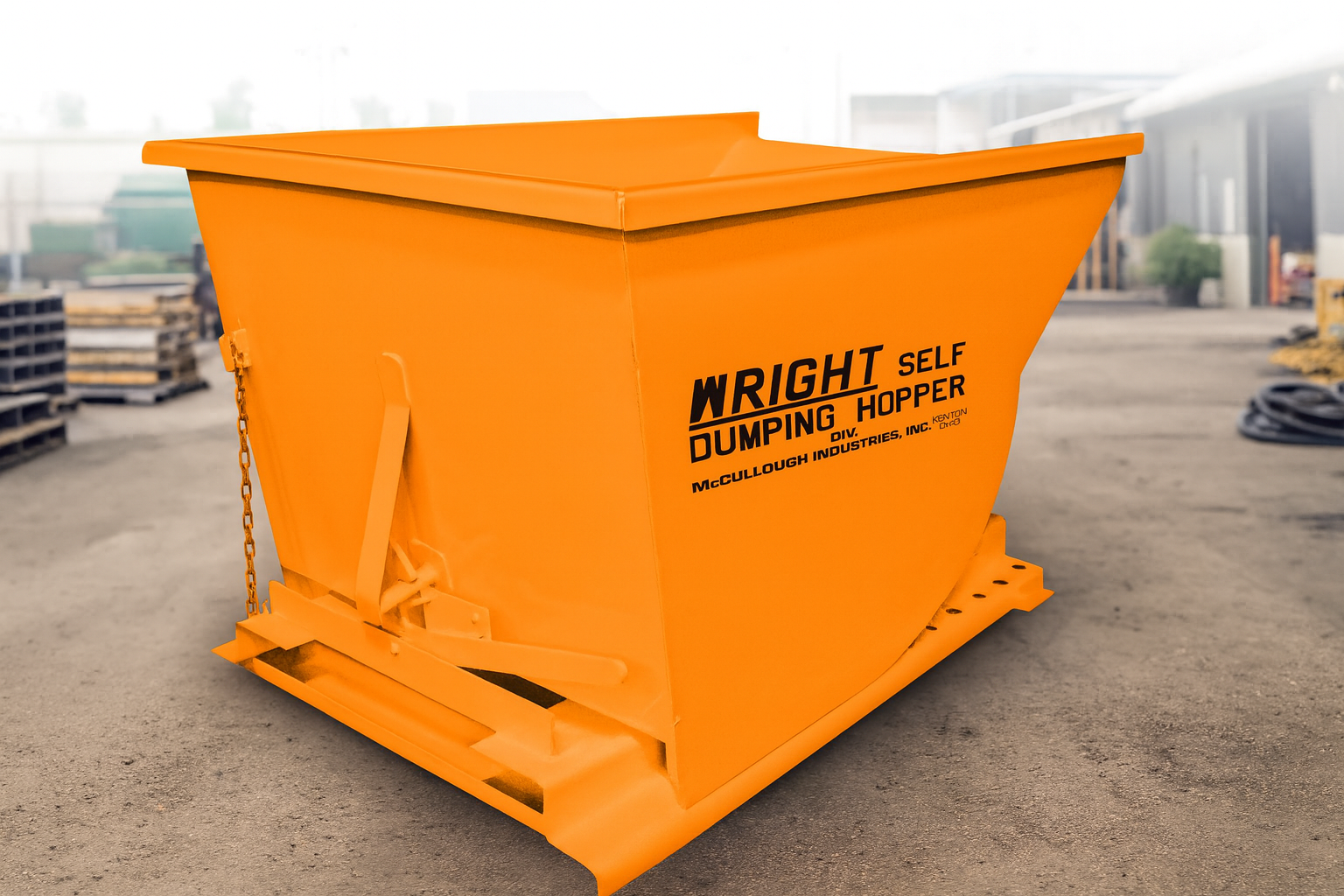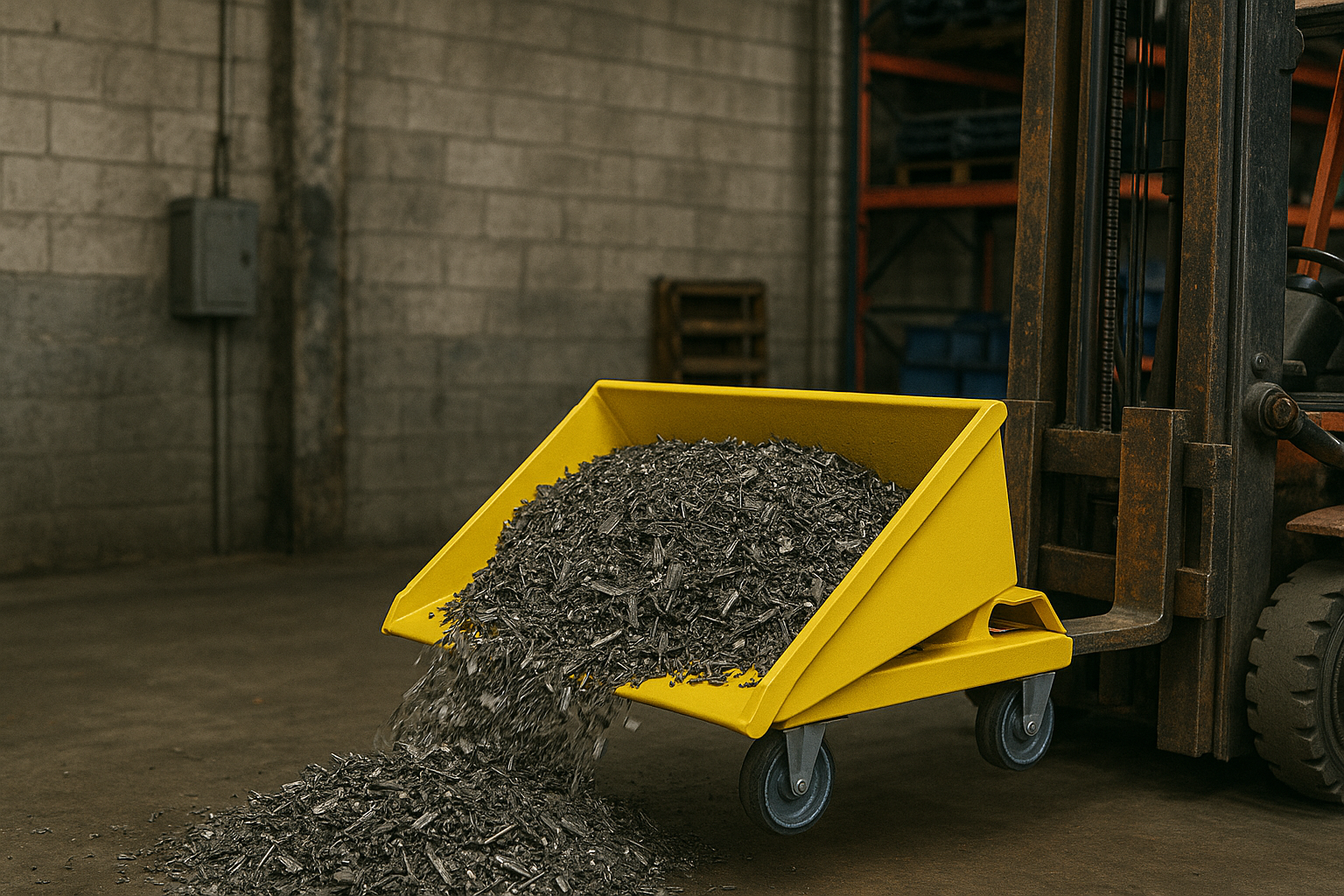
Optimizing Chip Hopper Drainage for CNC and Fabrication Facilities
In metalworking and machining environments, managing chip waste isn't just a cleanup issue, it's a critical part of keeping production safe, efficient, and compliant. The type of drainage design you choose in a chip handling hopper directly impacts fluid retention, floor cleanliness, coolant recovery, and even forklift safety.
At McCullough Industries, we engineer our Wright® Chip Handling Hoppers with purpose-driven designs that help metalworking teams manage both chips and fluids. One of the biggest decisions? Whether to use a wire mesh bottom or a solid steel base with optional drainage modifications.
This guide compares wire mesh and solid bottom designs to help you determine which best fits your workflow, material type, and maintenance preferences.
The Challenge: Managing Metal Chips and Coolant to Reduce Operational Risks
Most machining and fabrication operations generate metal shavings coated in cutting fluids or lubricants. Without proper drainage, these fluids accumulate inside the hopper, leading to:
- Corrosion and rust inside the hopper
- Unsafe slick floors during dumping
- Lost or wasted coolant
- Environmental concerns from improper fluid disposal
That’s why every Wright® chip hopper can be equipped with a drainage solution tailored to your setup.
Wire Mesh Bottoms: Maximum Drainage, Minimal Retention
A wire mesh bottom allows coolant and oil to drain freely from the chip pile, reducing standing fluid and overall weight. These hoppers typically include a drip pan or containment tray below to collect runoff safely.
Benefits of Wire Mesh Chip Hoppers
- Rapid fluid separation and evaporation
- Lighter hopper weight due to drainage
- Easier coolant recycling or containment
- Less floor splash during dumping
Ideal for: CNC shops with high coolant use, frequent chip disposal, and internal recycling systems.
Considerations: Wire mesh bottoms are best for dry indoor environments. In dusty or outdoor settings, mesh can clog or deteriorate faster than solid steel, requiring periodic cleaning.
Solid Bottoms with Drainage Ports: Controlled, Durable Drainage
A solid-bottom chip hopper gives you maximum containment with optional drainage features like plug-sealed ports or external drain spouts. These are ideal when full liquid retention is required or when operators want more control over fluid discharge timing.
Benefits of Solid Bottoms with Drainage Plugs
- Fully sealed design for oily or contaminated waste
- Optional manual fluid release
- Rugged performance for high-impact use
- Easier to clean and maintain
Ideal for: Facilities managing oily chips, contaminated fluids, or heavy waste that can damage mesh. These designs are common in defense, aerospace, and heavy machining environments.
Comparison Table: Wire Mesh vs Solid Bottom Drainage
| Feature | Wire Mesh Bottom | Solid Bottom with Drain Port |
|---|---|---|
| Drainage Speed | Fast, passive drainage | Manual or timed discharge |
| Weight Control | Lighter due to drainage | Slightly heavier with fluids |
| Fluid Control | Less precise | Fully controlled release |
| Maintenance | Mesh can clog | Easier to clean |
| Ideal Use | CNC chips, coolant-heavy waste | Oily scrap, contamination risk |
| Environmental Safety | Requires drip tray | Enclosed system |
Why Wright® Chip Hoppers Offer Both Options
McCullough Industries builds every chip hopper to match your actual workflow. We don’t force a one-size-fits-all drainage method. Whether you need full drainage via mesh or a sealed design with manual control, we can deliver:
- Optional wire mesh bases with drip trays
- Solid steel bases with sealed drain ports
- Stainless components for fluid-sensitive environments
- Modular tray or screen inserts for retrofitting
You get the exact drainage performance you need without compromising hopper integrity, forklift compatibility, or safety.
Engineering Add-Ons That Improve Drainage Management
McCullough offers several enhancements to help you dial in chip hopper drainage even further:
- Quick-clean mesh screens for faster maintenance
- Locking drain valves for safety compliance
- Removable drip pans for easy cleanup
- Gasketed lids to reduce splash
- High-temp resistant liners for hot chip containment
Safety Considerations in Drainage Design
Wet chip hoppers can be dangerous if not managed correctly. Sloshing fluids, dripping from forks, or slippery floors are all OSHA-reportable risks. That’s why Wright® chip hoppers include:
- Leak-resistant weld seams
- Floor-level drain routing
- Optional casters with floor locks to prevent movement
- Extended pour lips to direct waste flow away from operators
FAQs: Chip Hopper Drainage Design
Is wire mesh or solid bottom better for chip drainage?
It depends on your needs. Wire mesh allows faster passive drainage but requires a collection tray. Solid bottoms offer controlled discharge and better containment of oily or hazardous fluids.
Do I need a drip tray with wire mesh hoppers?
Yes. A tray or pan underneath collects the draining fluid to prevent spills and allows coolant capture.
Can I retrofit a solid-bottom hopper with drainage?
Yes. Wright® hoppers can be modified with drain ports, valves, or internal liners based on your fluid type.
Which design is more durable?
Solid-bottom hoppers tend to last longer in heavy-duty or outdoor applications. Mesh may require replacement over time if used in abrasive environments.
Do all chip hoppers come with drainage features?
No, but MCI offers drainage as a customizable feature. Every unit can be built with the right base, port, or tray for your shop.
Let’s Build the Right Hopper for Your Chips and Coolant
Drainage may seem like a detail, but it’s one that makes a big difference in how safely and efficiently your facility runs. Whether you need an open mesh design to reduce weight or a sealed base with a precision drain valve, McCullough Industries has the expertise to build it right.
We engineer every Wright® Chip Hopper to meet your specific chip load, handling method, and fluid management setup. Let’s spec a hopper that helps your team stay safe, clean, and compliant without slowing down.

